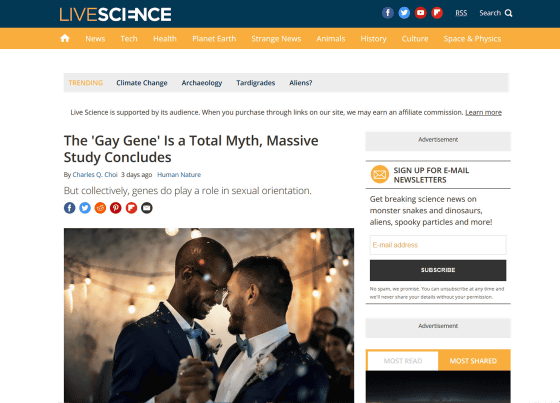Research results that “there is no specific gene that produces homosexuals”

by
In recent years, the understanding of sexual minorities such as homosexuals, bisexuals, and transgenders has increased, and the number of countries and regions that accept homosexual marriage is increasing. Meanwhile, researchers analyzed the genes of nearly 500,000 people, `` There are no specific genes that produce homosexuals, many genes, environments, life experiences etc. are involved little by little '' The result was announced.
Large-scale GWAS reveals insights into the genetic architecture of same-sex sexual behavior | Science
https://science.sciencemag.org/content/365/6456/eaat7693
There's No Such Thing as a 'Gay Gene,' Large Genome Study Finds
https://gizmodo.com/theres-no-such-thing-as-a-gay-gene-large-genome-study-1837675136
There's No Such Thing as a 'Gay Gene,' Massive Study Concludes | Live Science
https://www.livescience.com/no-single-gene-makes-someone-gay.html

An international team of researchers from Sweden, Denmark, the UK, the US, etc. analyzed the genetic data of approximately 470,000 volunteers collected by
“The data used in this study is about 100 times the size of previous studies on similar topics,” says Andrea Ganna , the main author of the paper. “Study on sexual orientation and genes is a controversial and sensitive issue,” said Fah Sathirapongsasuti , co-author of the paper, “the funding was limited and it was difficult to recruit participants.” Homosexuality is still a criminal offense in 70 countries, and some countries may be sentenced to death.
Analysis revealed that five genetic markers were found to have a preferential association with homosexual behavior, but this genetic marker alone could not influence human sexual orientation. It seems that the five genetic markers may certainly contribute to a homosexual trend, but the probability that a person born with all five markers will be gay is more likely than those who do not have a marker. It only seems to increase at a level of less than 1%.

by
However, although there is no specific “gene that determines sexual orientation”, it appears that sexual orientation and genetic factors are related, and the research team has found thousands of genes, including the five markers discovered this time. May affect sexual orientation. However, the influence of each gene is very small, and further research is needed to identify other markers.
The research team estimates that the rate of change that the five markers and all other genetic factors discovered will have on homosexuality will be around 8-25%. Sexual orientation is consistently higher for identical twins that share all their genetic makeup than twins that each share 50% of the gene. Was thought to be related to genes. While this study suggests that a wide variety of genes are involved in sexual orientation, it also suggests that genes alone do not determine human sexual orientation.
“This study emphasizes the role that the environment plays in shaping human sexual orientation, and many scattered throughout the genome, not a single gene,” said Benjamin Neil, a research team. It may be even more important that the genes of this group have a minor impact. ' The manner in which many genes and environments determine human characteristics applies to many characteristics such as height.

by
Ganna noted that in the course of research, he discovered that several biological pathways might be involved in homosexual tendencies. For example, one of the genetic markers involved in sexual orientation was related to olfaction, and it was also found that genetic markers that affect hair loss affect sexual orientation in men. In addition, it became clear that genetic markers have a stronger influence on sexual orientation in men than in women.
The research team pointed out that although this study was a large sample size, the volunteers were mostly people with roots in Europe living in wealthy countries, and the age was relatively large. The research team said that in other countries the results may be different, and may be different for people younger tolerant of sexual diversity than older people.

by manseok
Related Posts:
in Science, Posted by log1h_ik







